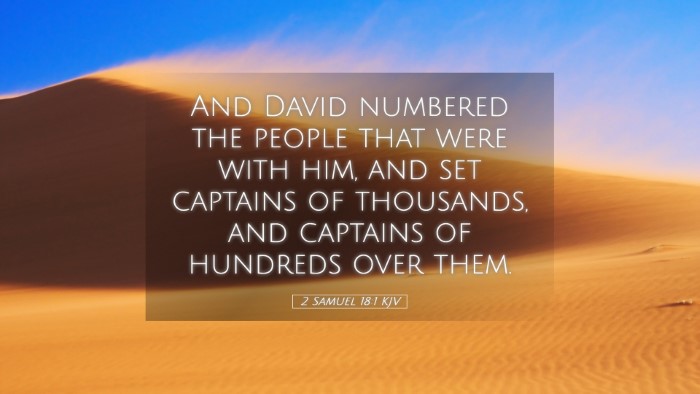Commentary on 2 Samuel 18:1
Verse Context: 2 Samuel 18:1 states, "And David numbered the people that were with him, and set captains of thousands and captains of hundreds over them." This verse appears in a crucial moment in the narrative of David's kingship, specifically during the rebellion of his son Absalom.
Matthew Henry's Commentary
Matthew Henry emphasizes the gravity of the situation David faced as he prepared for battle against Absalom. He notes that David, faced with personal betrayal and civil war, took the time to 'number' the people, reflecting both a strategic military action and an awareness of the looming conflict. This act of numbering the people not only signifies preparation but also highlights David's role as a leader who must assess his strengths and weaknesses before engaging in battle.
Leadership and Responsibility
David's action illustrates a broader principle of leadership—understanding one's resources and preparing the people for what lies ahead. Henry points out that good leaders must take stock of their situation, ensuring their followers are ready and organized. David's setting of 'captains of thousands and captains of hundreds' demonstrates a tactical approach aligning with military structures of the time, indicating wisdom in dividing responsibilities.
Albert Barnes' Commentary
Albert Barnes provides insight into the specifics of David's actions and their implications. According to Barnes, the numbering of the people suggests an urgency that pervades David's camp. The King is acutely aware that this is no ordinary battle; it involves not only political stakes but also familial relationships, invoking the need for careful strategy and planning.
Military Organization
Barnes highlights the importance of military organization in ancient Israel, drawing attention to the commanders' roles appointed by David. He suggests that such hierarchical structures are vital for efficiency in battle. The captains would lead smaller groups, enhancing communication and enabling swift responses to changes during the conflict. This foresight showcases David not as a passive monarch but as an actively engaged leader seeking victory through meticulous preparation.
Adam Clarke's Commentary
Adam Clarke elaborates on the verse by discussing the emotional and spiritual dynamics at play. Clarke notes the burden of leadership that falls on David. Being a father fighting against his own son adds a layer of tragedy to his actions. He reflects on the moral implications of such a conflict and the psychological weight David must bear.
Spiritual Dimensions
Clarke posits that David's leadership choices reflect his struggles of faith amid personal trials. He emphasizes the compatibility of faith with practical decision-making. It’s clear that David seeks divine favor as he prepares his forces, acknowledging his dependence on God while implementing human strategies. In this light, David becomes a representation of the faithful leader who engages actively in the face of adversity.
Theological Reflections
This verse, when examined through the lenses of the noted commentaries, reveals several theological truths relevant for pastors and scholars today:
- The Importance of Preparation: Just as David prepared his people for battle, leaders today must prepare themselves and their communities for spiritual warfare, understanding the need for strategic planning in ministry.
- The Weight of Leadership: The dual roles of being a leader and a close family member can create profound internal conflict, reminding us of the complex nature of human relationships and leadership.
- Divine Sovereignty in Human Affairs: Despite David's calculated preparations, the underlying truth is that God ultimately oversees the results of human endeavors, emphasizing the need for prayer and dependence on God's will.
- Community Role in Conflict: David's appointment of leaders reveals the significance of community structures in facing challenges, highlighting the value of teamwork in ministry settings.
Conclusion
In summary, 2 Samuel 18:1 serves as a potent reminder of the multifaceted responsibilities of leadership in the context of conflict. Through insights drawn from Matthew Henry, Albert Barnes, and Adam Clarke, we see that preparation, divine reliance, personal struggles, and community organization arise as central themes. By reflecting on this verse, one can glean practical applications for both personal and leadership challenges in contemporary spiritual contexts.


